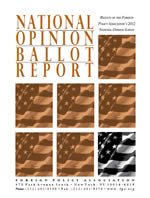Strong support for energy independence and diversification in FPA poll
Americans participating in the Great Decisions annual National Opinion Ballot express strong support for the Keystone Pipeline project and alternative energy supplies.
By Tyler Benedict
The world's energy markets have been shaken by the instability of Middle Eastern oil and the vulnerability of nuclear power. Such uncertainty is exacerbated by developing countries like China becoming bigger energy consumers, while energy producers like Russia are looking to expand their geopolitical influence.
The proposed Keystone XL pipeline, which would deliver 1.3 million barrels of crude oil per day from Canada to the U.S., is controversial. Supporters of the pipeline point out that it will contribute to U.S. energy security by lessening the U.S.’s dependence on Middle Eastern oil, while detractors point to the pipeline's negative environmental effects and argue that constructing the Keystone XL pipeline will only increase American dependence on fossil fuels. According to the Foreign Policy Association's National Opinion Ballot Report, 57% of respondents believe that the pipeline is "in the U.S. national interest." At the same time, however, 57% of respondents indicated that "the most appropriate way for the U.S. to ensure energy security" is to "develop alternative, more efficient energy supplies." Such responses suggest that balloters believe a balance can be struck between the Keystone XL pipeline in the short term with a reduction of fossil fuel use in the long term.
The environmental impact of fossil fuels has become a global issue, as reflected by the Kyoto Protocol. The Protocol, adopted in 1997, is a project of the United Nations that attempts to reduce the worldwide emissions of greenhouse gases by setting binding obligations on the world's industrialized countries. The U.S. has stated that it has no intention of ratifying the Protocol, making it a lone holdout among developed nations (although Canada announced in 2011 that it would withdraw from the Protocol). This stance does not seem to sit well with NOBR participants, as 79% of balloters supported U.S. ratification of the Kyoto Protocol, thereby taking a more international approach on the question of energy politics.
Energy geopolitics is an esoteric and rapidly changing game, and it requires the balancing of several diverse factors. Energy security in the short term is often contrasted with environmental security in the long term, and issues such as the Keystone XL pipeline and the Kyoto Protocol demonstrate the challenges of balancing these interests.







